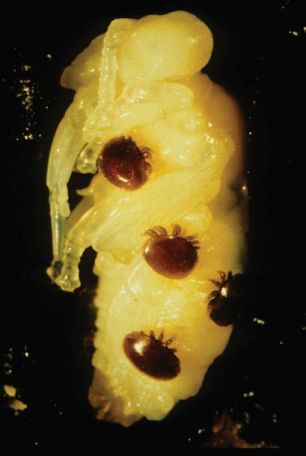Biosecurity Alert
POSTED ON JUNE 30, 2022
Update on Varroa Mite Detection in NSW – Expansion of Biosecurity ones
Varroa mite (Varroa destructor) was first detected in two of six sentinel hives at the Port of Newcastle on Wednesday 22 June 2022. All 6 sentinel hives and 4 private hives located nearby had bees euthanised and the hives inspected for mites.
Varroa destructor attacks European Honey bees (Apis mellifera) and is considered the greatest threat to Australia’s honey and honey bee pollination plant industries. Varroa mite is not established in Australia and we are one of the few counties in the world to remain free of it.
Since the first detection on 22nd June, Varroa mite was detected in one private hive at the sentinel site and also at a more distant location within the initial 10km emergency zone around the Port. As a result of further surveillance, there have now also been confirmed cases of Varroa mite at properties near Bulahdelah, Seaham, Hexham and in Newcastle itself and all sites have had eradication zones established around them.
Eradication plans include treatment of beehives within a 10 km emergency zone around infested sites and inspection of managed and feral honeybee colonies within a 25 km surveillance zone.
Varroa mite emergency zones cover areas within a 50 km radius of infested premises. Within the emergency zones, no hives can be moved and beekeepers must notify NSW DPI of the location of all hives using the details provided below.
NSW DPI has ordered a halt to the movement of beehives and bees across NSW, to protect the local honey industry from Varroa mite. This means no honey or honeycomb can be harvested anywhere in the state until that order is lifted. The only reason people can touch their hives is to conduct surveillance for Varroa mite or if they are under instruction from an authorised biosecurity officer.
Beekeepers can check whether their hives are in any of these zones at www.dpi.nsw.gov.au/varroa. All beekeepers responsible for bee colonies or hives in these areas must notify NSW DPI where their bees and hives are. This includes queen bees in cages and packaged bees.
Notification can be made;
- by telephone, to the Exotic Plant Pest Hotline 1800 084 881,
- by electronic transmission, using the online form Report a Biosecurity Concern (nsw.gov.au),
- by email, to location@emergency.dpi.nsw.gov.au.
If anyone in NSW has found Varroa mite, they must notify NSW DPI immediately.
For up to date information on the eradication campaign go to:
DPI NSW Website: www.dpi.nsw.gov.au/varroa
DPI Facebook Page: https://www.facebook.com/NSWDPI.Biosec
DAWE Outbreak Website: https://www.outbreak.gov.au/current-responses-to-outbreaks/varroa-mite


